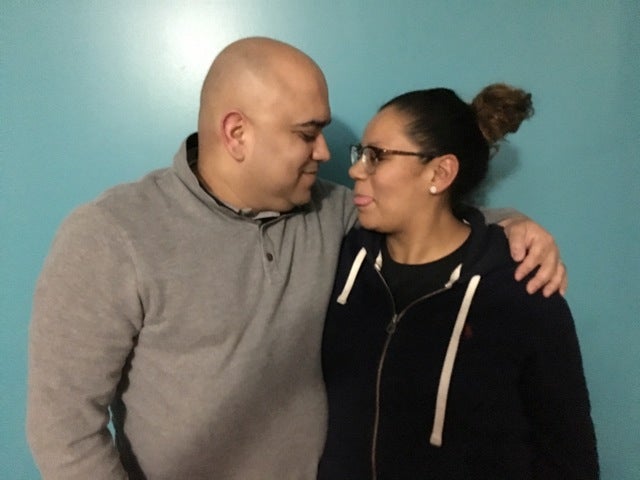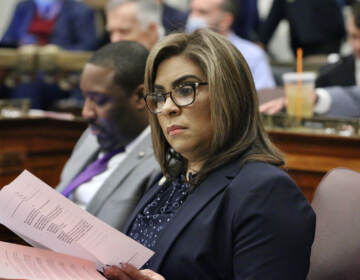Debate over Philly’s safe injection site plan gets personal
Evan and Darlene love each other. But they do not see eye to eye on safe injection sites. The debate has infused their conversations, in all hours of the day and night.
Listen 5:26
Evan and Darlene love each other. But they do not see eye to eye on safe injection sites. (Elana Gordon/WHYY)
When Darlene La Torre wakes up in the morning, there’s a good chance her husband of five years will want to kick off the day debating how to address the opioid crisis. And whether Philadelphia’s controversial proposal to open a supervised safe injection facility is a good idea.
Once at work, she’ll likely get an email or text from him linking to a study or article on the merits of such a site. When she gets home, she knows he’ll be poised to follow up. And if not then, then perhaps at 2 a.m.
“He wakes up and goes to the bathroom, and I just do the slightest move, and he’s like, ‘So yeah, I was thinking about this and that.’ And I’m like, ‘I’m trying to sleep right now!’ ” La Torre said.
Her husband, Evan Figueroa-Vargas, is unapologetic.
“I mean that’s how seriously I take saving someone’s life.” he said. “I don’t want to see another 1,200 people die next year.”
Figueroa-Vargas is referring to the estimated 1,200 people who died of drug overdoses — the majority due to opioids — last year in Philadelphia. He views a proposed safe injection site — where someone could bring their illegal drugs and then use them with clean equipment under the supervision of trained medical staff — as a vital intervention.
Ever since city leaders — including the mayor, the district attorney and the health commissioner — announced support for a possible safe injection site in Philadelphia, the public debate over the proposal has heated up. There’s the concern over where such a site would go and how that would impact drug use in neighborhoods.
When Figueroa-Vargas first heard about the idea, he too thought it was crazy. Now he’s turned into an all-out proponent, trying to win people over. He attends lots of community meetings, speaking out in support of the proposal.
Some of his biggest battles, however, are at home.
Determined, passionate
La Torre admires her husband’s 24/7 passion to improve the community, but a safe injection site is not an approach she supports.
“It gets kinda hot,” she said. “I’m like, really? We’re going to enable people to get high?”
Opposing views aside, the couple has been together for nearly eight years. They have a toddler named E.J., and they’re expecting twins. They both grew up in North Philadelphia, and they now live in the Northeast. (Figueora-Vargas also has a 10-year-old son from a previous relationship who lives in North Philly.) Each has firsthand experiences with addiction, experiences that have shaped their divergent views.
For La Torre and her side of the family, it’s about tough love.
“We’re like no-nonsense people,” she said. “My one brother, he used to do crack cocaine, and one day he woke up and was like, ‘I’m not doing this anymore,’ and has been clean 35 years. I feel like, if you don’t want to do it, you’re not going to do it anymore.”
The 2002 death of Figueroa-Vargas’ older brother from overdosing on a mix of cocaine and heroin, he said, weighs heavily on him.
“I definitely looked up to my brother, and it was painful,” he said. “It was painful. The way society and government have responded to the opioid epidemic as opposed to the crack epidemic is completely different. So I remember my neighbors — and even treatment providers, criminal justice officials — calling my brother a crackhead, ‘pipero’ in Spanish. It was just horrible.
“I remember him trying to do the right thing, but the way the criminal justice system is set up, they would just arrest him, he’d come home to no treatment and start smoking crack cocaine again.”
Figueroa-Vargas has also been in recovery for several years.
“I was using pills and narcotics for at least six years, and looking back it feels like six months,” he said.
“It’s amazing to see the person that he is today, cause, oh my God, he was so crazy back in the day,” said La Torre, smiling.
Figueroa-Vargas, who is working on a master’s degree in social work, manages homeless services at the nonprofit Mental Health Partnerships. He’s often engaging and advocating for people who are actively using drugs. Last year, the city invited him to be part of its opioid task force.
“I want to have a positive impact on Philadelphians,” he said. “I want my life to be meaningful. I want to help people.”
As for La Torre, she has a master’s in forensic psychology and works at her family’s auto shop in North Philly.
“It’s always been, at first, arrest them, they’re a danger, they’re doing crimes,” said La Torre. “It’s hard, especially with my dad — we have a body shop. His body shop has been broken into a whole bunch of times because people are looking for something they can sell for their next high.”
But would it work?
Figueroa-Vargas doesn’t see safe injection sites — or what the city is calling comprehensive user engagement sites (CUES) — as a silver bullet to remedy the drug crisis that’s tearing through communities around the region and country. But as he researched how sites have worked in other countries, and as overdose deaths continue to rise around here, he thinks it’s an important intervention that could help prevent overdose deaths.
“I understand the part about saving someone’s life,” La Torre told her husband. “I just don’t understand how it was going to work, how you’d prevent these deaths when people are trying to get high in this moment?”
Figueroa-Vargas paused for a moment, then responded.
“I totally agree, and I’m hopeful,” he said to her. “Honestly, my hope for safe injection sites is people don’t just come there to get high, right? That people come to access services around treatment support, housing support, some sort of legal services.”
“Don’t you feel some people will be scared to go there?” La Torre said.
“Absolutely, I do think people will be scared,” he responded. “I’m very realistic about this. There’s a lot of challenges. There’s a lot of questions, but all those questions at the end of day, I’m not going to allow that to become a roadblock to saving somebody’s life.”
So, could Figueroa-Vargas’ relentless campaigning work at all to change his wife’s mind?
“He makes some valid points,” she conceded.
La Torre said she has moved away from being 100 percent, completely opposed to the idea. But she’s still on the fence.
“It’s still a hard pill to swallow some days when you’re looking at it,” she said. “How is this really going to affect our community? I don’t want to see people getting high all the time. If I’m walking my son to school, will there be a safe injection site? How do I explain that to him, ‘Oh, people get high. It’s OK, there’s a doctor in there.’ ”
La Torre makes a lot of valid points, her husband acknowledged.
“I think about this a lot,” he said. “Do I want to see my son watch someone else smoke a crack pipe? Or is it a better idea to have a safe place where people can go?”
Figueroa-Vargas knows a lot of others — including his own parents — don’t agree with him. Still, he wants everyone in on this tough conversation.
And even if he is able to succeed at changing La Torre’s thinking some more, he doesn’t think that strategy is sure to work with others.
“Darlene loves me,” he said. “Besides, she wants to hear me stop talking about safe injection sites.”
WHYY is your source for fact-based, in-depth journalism and information. As a nonprofit organization, we rely on financial support from readers like you. Please give today.



